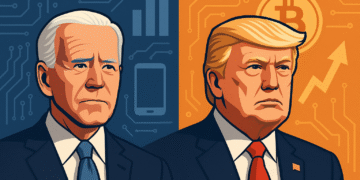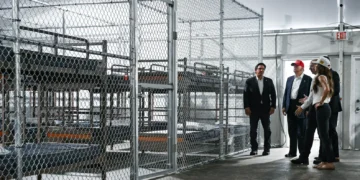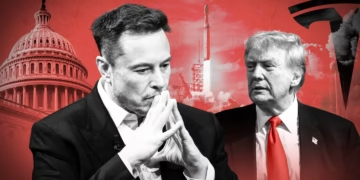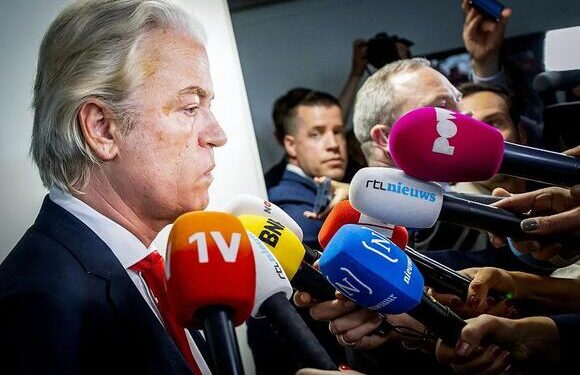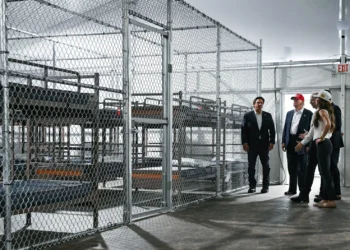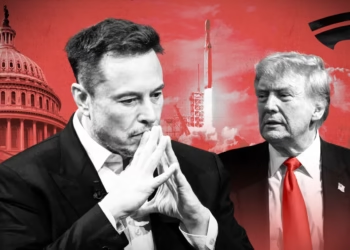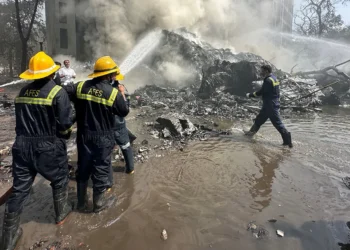The Netherlands is facing a significant political upheaval after the collapse of its government. Geert Wilders, the leader of the far-right PVV party, withdrew his support from the coalition due to disagreements over migration policy.

This move has sent shockwaves through Dutch politics and raised questions about the country’s future direction. The migration crisis has been a contentious issue, with the PVV party advocating for stricter controls.
The collapse of the coalition has significant implications not only for the Netherlands but also for Europe, as it grapples with its own migration challenges.
Key Takeaways
- The Dutch government’s collapse is attributed to disagreements over migration policy.
- Geert Wilders’ PVV party withdrew from the coalition, triggering the collapse.
- The migration crisis remains a contentious issue in Dutch and European politics.
- The future direction of the Netherlands is uncertain following this political upheaval.
- Europe is watching the situation closely, given its own migration challenges.
The Dutch Government Collapses: Understanding the Crisis
The collapse of the Dutch government marks a significant shift in the country’s political landscape, driven by disputes over migration. This crisis has been unfolding for some time, with Geert Wilders and his Party for Freedom (PVV) at the center of the controversy.
Geert Wilders’ Dramatic Withdrawal of PVV Support
Geert Wilders’ decision to withdraw his party’s support for the government was the final nail in the coffin. Wilders had been pushing for a 10-point plan to harden the country’s asylum policy, which included measures such as freezing asylum applications and limiting family reunification. However, these proposals were met with resistance from the coalition partners.
The PVV leader’s dramatic move was not taken lightly, as it led to the collapse of the government. As Wilders stated, “We cannot continue to support a government that does not share our values on migration.” This statement highlights the deep-seated differences within the coalition.
Migration Policy as the Breaking Point
The disagreement over migration policy was the primary cause of the government’s collapse. Wilders’ proposed 10-point plan was seen as too extreme by the coalition partners, leading to an impasse. The plan included:
- Freezing asylum applications
- Limiting family reunification
- Stricter criteria for asylum seekers
- Reducing the number of asylum centers
- Improving border control
- Enhancing deportation policies
- Reducing legal aid for asylum seekers
- Limiting the role of the judiciary in asylum cases
- Increasing penalties for illegal residence
- Improving international cooperation on migration
The failure to reach a consensus on these measures ultimately led to the downfall of the government. As the situation continues to unfold, it remains to be seen how the Netherlands will navigate this political crisis.
Behind the Breakdown: Political Tensions and Ideological Divides
The collapse of the Dutch government was not just a sudden event, but the result of underlying political tensions and ideological divides. The coalition between the PVV, VVD, BBB, and NSC was fragile and struggled to reach a consensus, with Wilders’ party pushing for a harder line on immigration.

Right-Wing Agenda Meets Centrist Resistance
The PVV, led by Geert Wilders, has been known for its right-wing agenda, particularly on issues related to immigration and asylum policies. This stance often put them at odds with their more centrist coalition partners, who were more cautious in their approach to reforming the Dutch asylum system.
The tension between the right-wing PVV and the centrist parties was a significant factor in the government’s collapse. The PVV’s push for stricter immigration policies was met with resistance from the VVD and other coalition partners, who were concerned about the potential legal and ethical implications of such policies.
| Party | Political Stance | View on Immigration |
|---|---|---|
| PVV | Right-wing | Strict immigration policies |
| VVD | Centre-right | More moderate approach |
| BBB | Centre | Balanced approach |
| NSC | Centre | Conciliatory stance |
The Fragile Coalition Structure
The Dutch government’s coalition structure was inherently fragile due to the diverse political stances of its members. The differences between the PVV and other coalition partners were not just limited to immigration policies but also extended to other areas of governance.
The coalition’s inability to reconcile these differences ultimately led to its downfall. The collapse highlights the challenges faced by coalition governments in maintaining stability and achieving consensus on contentious issues.
Timeline: From Electoral Victory to Government Failure
The 2023 Dutch elections marked a turning point in the country’s political landscape, with the PVV’s win triggering a chain reaction that ultimately led to the government’s downfall.
PVV’s Surprising 2023 Election Win
The PVV’s victory in the 2023 elections was unexpected, as they secured a significant number of seats in the parliament. This win gave Geert Wilders, the PVV leader, a strong mandate to form a government. However, the PVV’s right-wing agenda was met with resistance from other parties.
As Geert Wilders stated, “Our victory is not just a win for the PVV, but a signal for change in the Netherlands.” This sentiment was echoed by many of his supporters, who were eager for a shift in the country’s migration policy.
The Challenging Coalition Formation Process
Following the PVV’s win, the coalition formation process began, involving negotiations with potential partners. The process was challenging due to the PVV’s controversial stance on migration and other issues. Despite these challenges, the PVV managed to form a coalition government.
The coalition partners had differing views on key issues, which created tension. As one politician noted, “The coalition is fragile, and any misstep could lead to its collapse.” This tension was evident in the negotiations, where ideological differences threatened to derail the process.
“The Dutch people have spoken, and now it’s our turn to deliver on their expectations,” said a senior PVV official during the coalition formation talks.
Escalating Disagreements and Final Collapse
As time passed, disagreements within the coalition escalated, particularly over migration policy. Geert Wilders’ withdrawal of support for the government marked the beginning of the end. The final collapse came when the coalition partners failed to resolve their differences.
The government’s collapse was met with a mix of reactions from the public and politicians. As a political analyst observed, “The collapse was not unexpected, given the deep divisions within the coalition.” The caretaker government, led by Dick Schoof, was tasked with navigating the political limbo until new elections could be held.
The timeline of events highlights the complexities of Dutch politics and the challenges of forming a stable government. The PVV’s win and subsequent government collapse have left the Netherlands in a state of political uncertainty.
Key Players in the Dutch Political Drama
The recent collapse of the Dutch government has brought to the forefront several pivotal figures shaping the nation’s political future. Understanding the roles and motivations of these key players is crucial to grasping the complexities of the current crisis.
Geert Wilders: The Controversial PVV Leader
Geert Wilders, the leader of the Party for Freedom (PVV), has been a central figure in the Dutch political drama. His decision to withdraw the PVV’s support from the government was met with significant backlash from coalition partners, including Dilan Yesilgoz-Zegerius and Caroline van der Plas. Wilders’ controversial stance on migration and his right-wing agenda have been key factors in the political tensions leading to the government’s collapse.

Dick Schoof: Leading the Caretaker Government
Dick Schoof has taken on the role of leading the caretaker government, a position that requires navigating the country through a period of political limbo. The caretaker government’s responsibilities include addressing critical issues and maintaining the stability of the nation until a new government is formed.
Coalition Partners: Yesilgoz-Zegerius, Van der Plas, and Others
The coalition partners, including Dilan Yesilgoz-Zegerius of the VVD and Caroline van der Plas of the BBB, have played significant roles in the political negotiations and disagreements that led to the government’s collapse. Their reactions to Geert Wilders’ withdrawal of support highlighted the deep divisions within the coalition.
| Key Player | Role | Political Party |
|---|---|---|
| Geert Wilders | Leader | Party for Freedom (PVV) |
| Dick Schoof | Head of Caretaker Government | – |
| Dilan Yesilgoz-Zegerius | Coalition Partner | VVD |
| Caroline van der Plas | Coalition Partner | BBB |
The interplay between these key players will continue to shape the future of Dutch politics, influencing the potential outcomes of the upcoming elections and the formation of a new government.
The Migration Policy Conflict That Tore the Government Apart
A deep-seated disagreement over migration policy, driven by Wilders’ 10-point plan, ultimately tore the Dutch government apart. The plan, which included measures such as halting asylum applications and limiting family reunification, raised significant legal and ethical concerns among the coalition partners.
Analyzing Wilders’ 10-Point Migration Plan
Wilders’ 10-point migration plan was a comprehensive and stringent set of proposals aimed at drastically reducing asylum applications and tightening immigration policies. Key elements included:
- Halting asylum applications for those not directly threatened by violence or persecution
- Limiting family reunification to immediate family members only
- Revoking residency permits for individuals who failed to integrate into Dutch society
- Enhancing border controls to prevent illegal crossings
These measures were designed to be far-reaching and impactful, reflecting Wilders’ hardline stance on immigration.
Legal and Ethical Objections from Coalition Partners
The coalition partners raised several objections to Wilders’ plan, citing legal and ethical concerns. They argued that some measures, such as halting asylum applications, could violate international law and the European Convention on Human Rights.
“We cannot simply abandon our obligations under international law. The proposals put forth by Wilders are not only legally dubious but also ethically questionable.”
Coalition partners also expressed concerns about the potential humanitarian impact of such stringent policies, particularly on vulnerable populations such as refugees and asylum seekers.
The Constitutional Hurdles to Rapid Policy Change
Implementing Wilders’ 10-point plan would require significant changes to existing Dutch and EU laws, posing substantial constitutional hurdles. Any rapid policy changes would need to navigate the complex Dutch legislative process, which includes scrutiny by the Council of State and potentially the courts.
Key constitutional hurdles include:
- Ensuring compliance with EU law and international treaties
- Navigating the Dutch legislative process, which involves multiple readings and potentially significant amendments
- Addressing potential legal challenges from human rights organizations and other stakeholders
These hurdles would likely slow or even derail attempts to implement Wilders’ plan in its original form, highlighting the challenges of making drastic changes to migration policy.
Dutch Asylum System: Current State and Proposed Reforms
The current state of the Dutch asylum system is a pressing concern, with many questioning its capacity to handle the recent influx of asylum seekers. The Netherlands has seen a significant number of asylum applications, putting a strain on the existing infrastructure and sparking debates about the need for reforms.
Migration Statistics and Trends in the Netherlands
The Netherlands has experienced a notable increase in asylum applications over the past few years. According to recent statistics, the country has seen a surge in applications from individuals fleeing conflict zones and seeking refuge. This trend is reflected in the data from the Dutch Immigration and Naturalisation Service (IND), which shows a steady rise in asylum claims.
Key statistics include:
- A significant increase in asylum applications from countries affected by conflict.
- A rise in the number of asylum seekers from regions experiencing humanitarian crises.
- An increase in the average processing time for asylum claims, leading to longer waiting periods for applicants.
Existing Policies and Their Effectiveness
The Dutch asylum system operates under a framework of policies and regulations designed to manage the flow of asylum seekers and ensure that those in need receive appropriate protection. The existing policies include measures for assessing asylum claims, providing shelter, and integrating asylum seekers into society.
However, the effectiveness of these policies is a subject of ongoing debate. Critics argue that the current system is overwhelmed, leading to delays in processing claims and inadequate support for asylum seekers. Proponents of reform argue that streamlining the process and improving infrastructure could help alleviate some of the pressures on the system.
Public Opinion on Immigration and Asylum
Public opinion on immigration and asylum in the Netherlands is divided. While some segments of the population are supportive of asylum seekers and advocate for more inclusive policies, others express concerns about the impact of immigration on the country’s culture, economy, and resources.
Recent surveys indicate:
- A polarized public opinion, with some people strongly in favor of welcoming asylum seekers and others calling for stricter controls.
- Concerns about the economic and social integration of asylum seekers.
- Debates about the role of the Netherlands in providing asylum within the broader European context.
The proposed reforms aim to address some of these concerns by improving the efficiency of the asylum process and enhancing support for asylum seekers. As the Dutch government navigates these challenges, it must balance the need for effective migration management with the imperative to protect those seeking refuge.
European Context: The Rightward Shift in Immigration Politics
Across Europe, a rightward shift in immigration politics is gaining momentum, as seen in the recent Dutch government collapse. This trend is not isolated to the Netherlands; several European countries are adopting more stringent immigration policies, reflecting a broader change in the political landscape.
Similar Political Developments Across EU Member States
Countries like Sweden, Denmark, and Italy have already implemented stricter asylum laws, signaling a shift towards more conservative immigration policies. For instance, Sweden has introduced border controls and reduced asylum benefits, while Denmark has passed laws allowing for the confiscation of valuables from asylum seekers.
Key Developments in EU Member States:
| Country | Policy Change | Impact |
|---|---|---|
| Sweden | Introduced border controls and reduced asylum benefits | Reduced asylum applications |
| Denmark | Passed laws allowing for the confiscation of valuables from asylum seekers | Controversy over human rights |
| Italy | Implemented stricter asylum laws and increased border security | Reduced migrant arrivals |
Recent European Court Rulings on Asylum Rights
The European Court of Justice has played a crucial role in shaping asylum policies across the EU. Recent rulings have both supported and challenged national policies, influencing the broader European discourse on immigration.
A notable ruling by the European Court of Justice emphasized the need for EU member states to ensure fair and efficient asylum procedures, highlighting the complexities of harmonizing immigration policies across the EU.
EU-Wide Migration Policies Under Pressure
The EU is facing significant challenges in developing a unified migration policy that balances the needs of its member states. The current system is under strain, with some countries calling for greater solidarity and others pushing for more national control over immigration.
The ongoing debate highlights the tension between EU-wide policies and national interests, with implications for the future of European immigration politics.
The Caretaker Government: Navigating Political Limbo
As the Dutch government collapses, the caretaker government led by Dick Schoof takes the reins, navigating the country through a period of political uncertainty. This transitional administration plays a crucial role in maintaining stability and ensuring the continuity of governmental functions until a new coalition is formed.
Legal Powers and Limitations During the Transition
The caretaker government, by its nature, has limited powers. It is tasked with managing the day-to-day affairs of the state but is generally not empowered to make significant policy decisions or introduce major reforms. This limitation is designed to prevent any substantial changes that might prejudice the formation of a new government or alter the political landscape before elections or coalition negotiations are concluded.
Key limitations include:
- Making major policy decisions
- Introducing significant legislative changes
- Committing to long-term financial or international agreements
Critical Issues Requiring Immediate Attention
Despite its limited powers, the caretaker government must address several critical issues that cannot be postponed. These include:
- Managing the ongoing migration crisis and ensuring the continued functioning of the asylum system.
- Overseeing the national budget and financial obligations.
- Maintaining public order and safety.
- Continuing international diplomatic and trade relations.
These tasks require careful handling to prevent any destabilization of the political or economic environment.
Historical Precedents in Dutch Politics
The Netherlands has experienced periods of caretaker governments in the past, providing valuable precedents for the current situation. Historical examples can offer insights into how such governments have navigated complex political landscapes and the challenges they faced.
By examining these precedents, we can better understand the potential trajectory of the current caretaker government and the implications for Dutch politics.
Looking Ahead: New Elections and Potential Scenarios
The Dutch political landscape is poised for change as new elections loom on the horizon. The collapse of the current government has left the country in a state of political limbo, with many questions about what the future holds.
Expected Timeline for Dutch Elections
The exact timeline for new elections is uncertain, but it is expected to be in the autumn. This timing is crucial as it will give political parties a few months to campaign and for voters to consider their options.
Key Dates to Watch:
- August: Political parties begin their campaigns in earnest
- September: Election debates and forums gain momentum
- November: Potential coalition formation begins after the election
Possible Coalition Configurations
The outcome of the elections will determine the potential coalition configurations. With Geert Wilders’ PVV having been a significant player in the previous government, their performance will be closely watched.
| Coalition Scenario | Potential Partners | Key Policies |
|---|---|---|
| Right-Wing Coalition | PVV, possible other right-wing parties | Stricter migration policies, potential constitutional changes |
| Centrist Coalition | Moderate parties, potentially including some former coalition partners | Moderate migration policies, focus on economic stability |
| Coalition involving PVV and Centrists | PVV and moderate or center-right parties | Balanced approach to migration, economic policies |
Will Wilders Gain or Lose Support?
Geert Wilders’ PVV is expected to be a major player in the elections. Their performance will depend on various factors, including their campaign strategy and public perception of their policies.
The PVV’s 10-point migration plan has been a contentious issue, with both supporters and detractors. The party’s ability to navigate the complex political landscape will be crucial to their success.
Conclusion: What the Dutch Crisis Means for National and European Politics
The collapse of the Dutch government has significant implications for both national and European politics, particularly in the context of immigration policy. The crisis, triggered by Geert Wilders’ withdrawal of support over migration issues, highlights the deep-seated ideological divides within the Dutch political landscape.
As the Netherlands navigates this political turmoil, the impact on national politics is likely to be substantial. The caretaker government, led by Dick Schoof, faces the challenge of maintaining stability while addressing critical issues, including the ongoing migration crisis. The outcome of the upcoming elections will be crucial in determining the future direction of Dutch politics.
On a broader scale, the Dutch crisis reflects a wider trend in European politics, where immigration policy is becoming increasingly contentious. The European Union will be watching the developments in the Netherlands closely, as they may have implications for EU-wide migration policies. The Dutch crisis underscores the need for a cohesive and effective immigration policy at both the national and European levels.
As Europe continues to grapple with the complexities of immigration, the Dutch experience serves as a significant case study. The interplay between national politics and European policies will be critical in shaping the future of immigration policy across the continent.
FAQ
Why did the Dutch government collapse in 2025?
The Dutch government collapsed due to a disagreement over migration policy, triggered by Geert Wilders’ decision to withdraw his party’s support.
What is Geert Wilders’ migration policy?
Geert Wilders proposed a 10-point plan to harden the country’s asylum policy, which was met with resistance from the coalition partners.
Will there be new elections in the Netherlands?
Yes, new elections are expected to take place, although the exact timeline is uncertain.
What is the current state of the Dutch asylum system?
The Dutch asylum system is facing challenges, with ongoing debates about its effectiveness and the need for reforms.
How will the collapse of the Dutch government affect European politics?
The collapse is part of a broader European trend towards more restrictive immigration policies, potentially influencing EU-wide migration policies.
What is the role of the caretaker government during the transition period?
The caretaker government, led by Dick Schoof, will navigate the transition, with limited powers, and address critical issues requiring immediate attention.
What are the possible coalition configurations after the new elections?
The possible coalition configurations are uncertain, depending on the election results, and may involve various parties, including the PVV.
How will the Dutch government’s collapse impact Geert Wilders and the PVV?
The collapse may either boost or harm Wilders’ and the PVV’s popularity, depending on how the situation unfolds and the party’s future strategy.
What are the key issues driving public opinion on immigration and asylum in the Netherlands?
Public opinion is influenced by various factors, including migration statistics, existing policies, and the proposed reforms.
How does the Dutch crisis relate to broader European trends in immigration politics?
The Dutch government’s collapse reflects a wider European shift towards more restrictive immigration policies, with similar developments in other EU member states.



